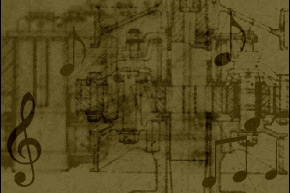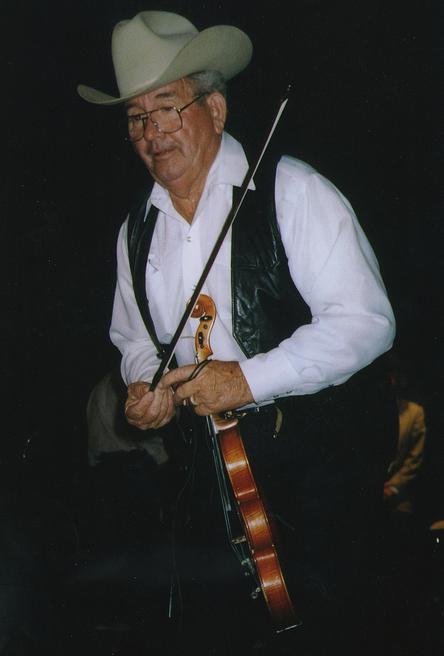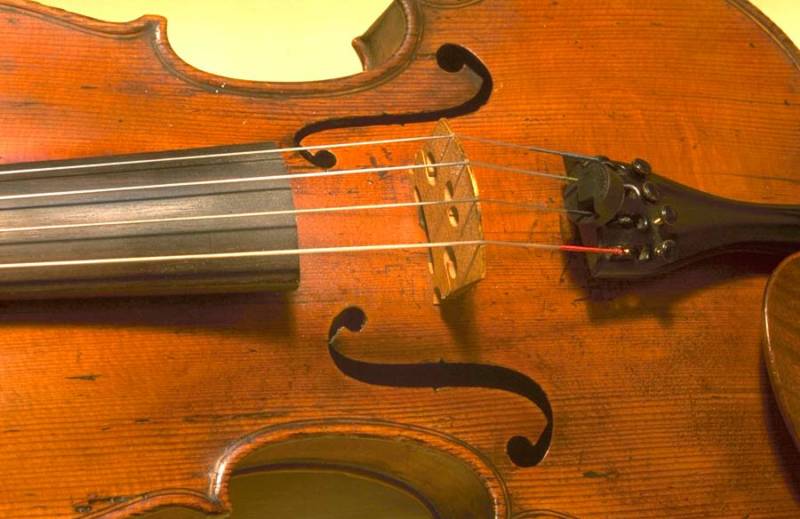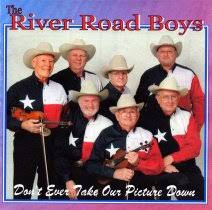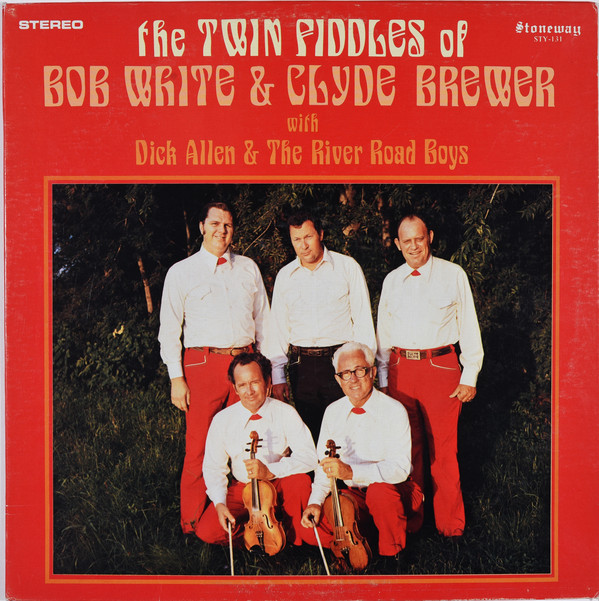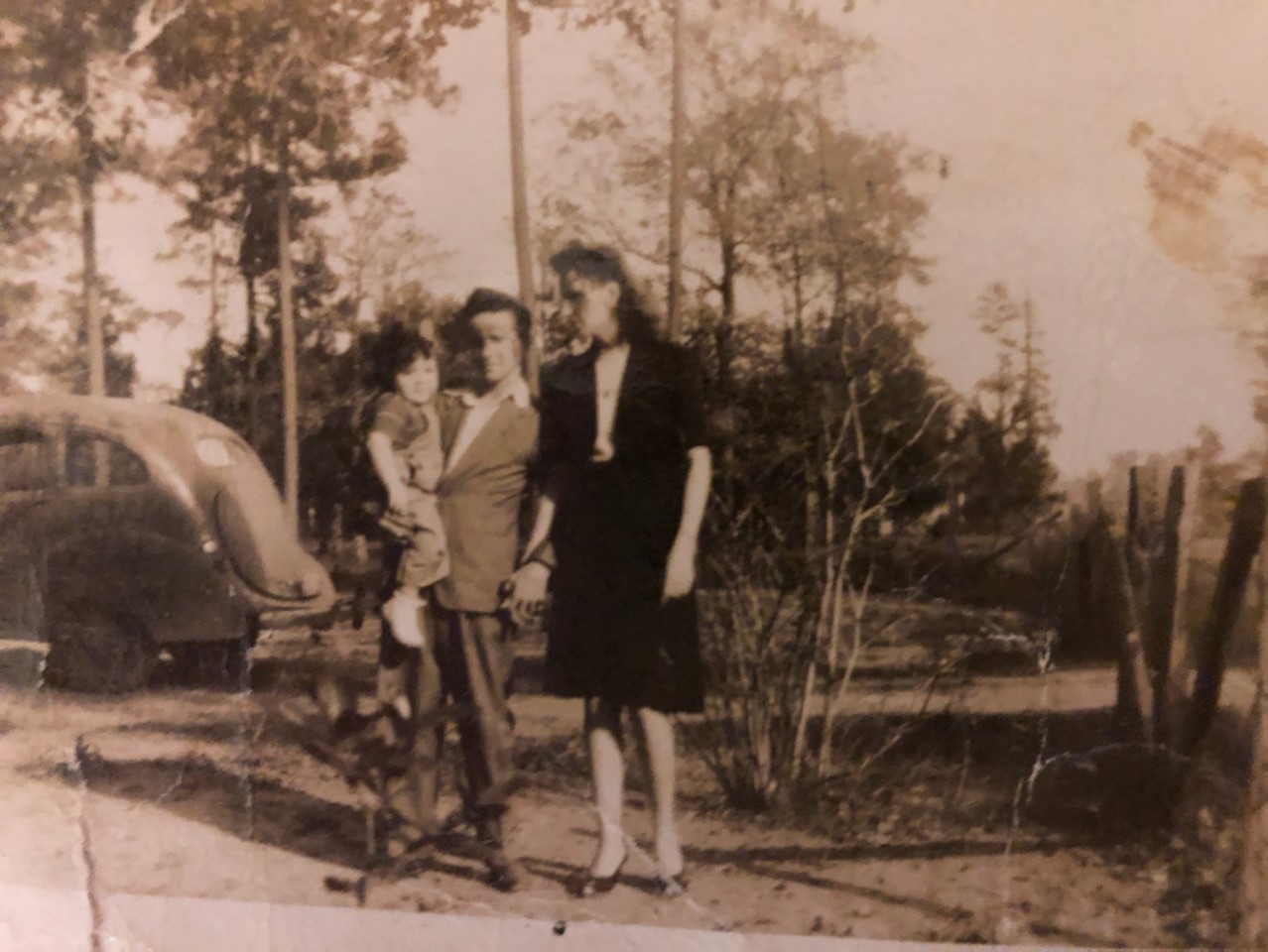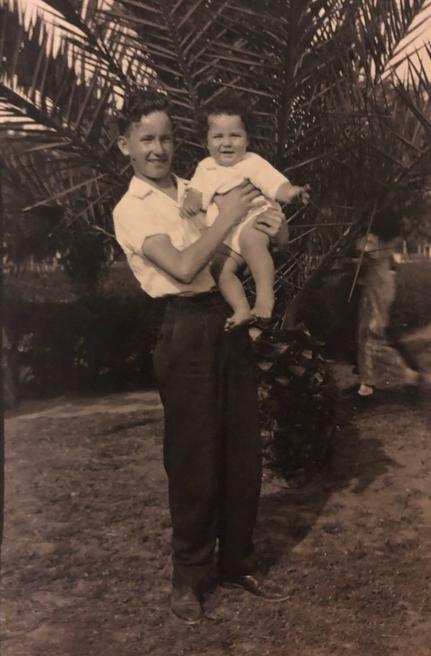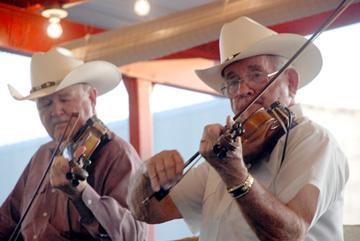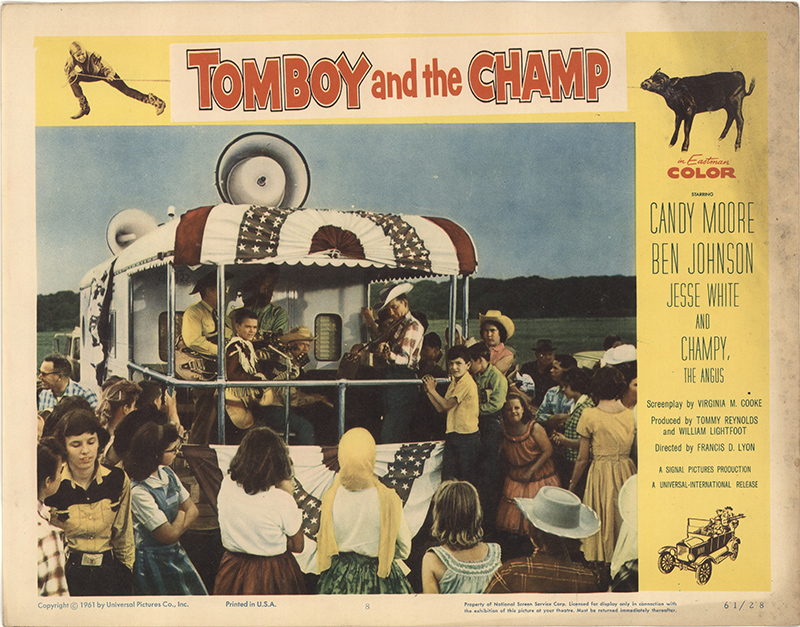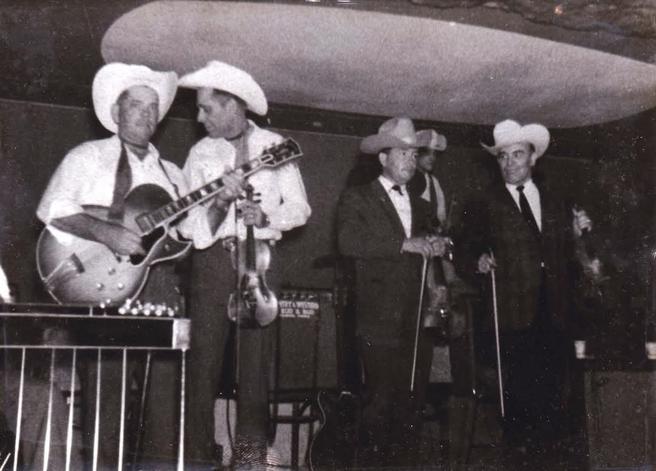Clyde became one of the great pioneers of Texas Music and Western Swing. His professionalism, musicianship, and leadership ability came with a sharp wit and great sense of humor. He was knowledgeable of all the greats who came before him, and had the ability to recall many humorous stories about the lives of the musicians he had played with over his storied career, as well as when, where, and who was on any particular recording session or playing job.
He was a devout Christian, and the kind of fellow other men respected and admired. He was multi-talented, a good player of many musical instruments, i.e., the fiddle, mandolin, piano, guitar, bass and drums. Clyde was simply a “musician’s musician.”
His parents never realized his talent until, at age 7, they took him to a drive-in stand in his hometown of Luling, where he saw an old black man playing a guitar and singing the blues. The fellow’s name was J.C. and Clyde figured if he changed his name to J.C. then he could play the blues also. So he pleaded with his mother to re-name him J.C. Of course, she would do no such thing. Clyde got even, though. He named his son Joel Clyde Brewer, or J.C., who, with a name like that, had to become a good musician himself.
His mother, who played some piano, realized Clyde’s music potential when she saw that he could remember lyrics and play melodies just by listening. She had taught him to play a few tunes on the piano and guitar. He practiced and played like J.C. all week, wanting to be just like his hero. When his grandparents came over for Sunday dinner after church, he played a new song for them, one of J.C.’s “rather raunchy” blues. Of course, being so young, he didn’t know what the words were really saying. When his mother heard him belt out J.C.’s ”blues” she immediately had him pick another song to sing, after all, his grandfather was a Methodist preacher and had just preached that very morning. So he picked “Deep Ellum Blues,” a song about prostitutes working the red light district known as Deep Ellum in Dallas. Of course, his mother was embarrassed but he played it anyway.
Clyde’s half-brother, Shelly, Jr. (who is also a member of the River Road Boys) tells this story about Clyde and Shelly, Sr.’s relationship. As a member of the Alley Cats, Clyde, in addition to playing in the band, tried to keep the rest of the band, including Shelly, out of trouble. Not to mention that Clyde was only 13 years old. One night while Shelly was singing, the P.A. system went out. Clyde looked at it to see if it could be fixed. It had shorted out and melted down inside. Shelly told Clyde to fix it. Clyde says, “It can’t be fixed!” Shelly said, ”Either you fix it or you’re fired!” Clyde replied, ”Well, I guess I’m fired!” He packed up and went home, leaving Shelly in a dither on the bandstand. Of course, Clyde was back on the bandstand the very next night!
Once, Shelly noticed a couple of well-dressed men watching and listening to the band. More than likely, they were musicians. They were really impressed with Clyde playing the mandolin. Shelly became more aware and suspicious of them watching Clyde. He was afraid they might try to hire Clyde away from him. Finally, Shelly says to them, ”Listen, you fellas would have a better chance of going to Hollywood and hiring Jackie Cooper than you would this boy!”
Clyde was a great mandolin player, even at his young age. He once saw the great Tiny Moore playing jazz on the mandolin, with only 4 strings instead of the 8 normally played as in bluegrass. He tried it with 4 strings and loved it. He still plays it very well, along with the fiddle and piano.
Clyde learned a lot about being a musician when he was very young, good sound principles and some very “solid” techniques, plus some not-so-good habits from some of the characters he shared the bandstand with. Guys like Jack and Shang Kennedy, Smokey Wood, Leo Raley, Darold Raley, Link Davis and others. He watched and listened to other musicians and tried to emulate them, except for their “bad” habits.
Clyde worked with many bands in the 40’s, 50’s and 60’s in the Houston-Beaumont area, namely Patsy and the Buckaroos, Dickie and Laura Lee McBride, Red Novak, Clif Bruner, and Moon Mullican. All these great musicians were strong influences on Clyde’s musicianship and playing style.
One very prominent influence was Clif Bruner, whose fiddle style has been emulated by several great fiddlers, such as Johnny Gimble. Clif always had a great band and was a great bandleader, receiving much acclaim in his early days as a fiddle player with Milton Brown and His Musical Brownies. Clif always referred to Clyde as “Little Boy” and loved, admired and respected Clyde as if he were his own son. Though Clyde was small-ish in stature, he would become a giant in western swing. You could hear some of Clif’s influences in Clyde’s fiddle playing. Like Clif, Clyde knew how to lead a band and keep things running smoothly, getting the best out of the players around him. Clyde’s fiddle playing was also influenced by J. R. Chatwell who played many years with Adolph Hofner. Most of the time when Clyde played fiddle you would hear a Clif or J.R. lick now and then!
The legendary Moon Mullican also influenced Clyde very much in his early years. He was in Moon’s band at 17 and was often asked to sub on piano in Moon’s place when Moon was “under the weather.” Clyde could pound out the “Moon”- style on piano, as if Moon was sitting there himself.
One of Clyde’s accomplishments was playing a bit part (along with his good friend Paul Buskirk) in the 1961 movie, “Tomboy and the Champ,” starring Ben Johnson and directed by Francis D. Lyon.
Clyde claims God granted him two careers in his life that enabled him to support his family. First, as a musician and secondly, he worked for 30 years for the City of Houston Public Works (Water Department). He would rise in rank, becoming a district supervisor. He was loved and respected by his peers, retiring from the City of Houston in 1985. He was always willing to help someone out, especially musicians. Of course, as a city supervisor he could hire personnel whenever he saw fit. Anytime a musician moved to town, word would get around, and soon he would get them on at the Water Department for a steady, weekly income in order to help them get established. He helped out several fellow musicians and friends such as fiddler, Bob White, guitarist Troy Passmore, steel guitar legend Herb Remington, another great steel guitarist, Gene Crownover, and piano man, Doc Lewis, and the River Road Boys’ vocalist Jim Johnson, by getting them on at the City of Houston. It became evident that whenever Clyde would approach his city supervisor with a new employment application, the boss would just grin and ask, “What instrument does this guy play?” Clyde retired from the City of Houston at age 55, and has devoted his life to playing music with The River Road Boys.
There are many other very amusing stories about Clyde, his music career and his association with other fellow musicians, which space does not allow. He has shared the bandstand with many legends and stars including Bob Wills, Willie Nelson, Merle Haggard, Floyd Tillman, Clif Bruner, Moon Mullican, Hank Thompson, Mel Tillis, Hank Williams, Sr., Homer and Jethro…the list is endless.
Clyde was the leader of The River Road Boys for 40 years. He is an inductee into several Western Swing Halls of Fame, including the Western Swing Society Hall of Fame in Sacramento, California, the Pioneers of Western Swing Society Hall of Fame in Seattle, Washington, the Golden Spike Hall of Fame in Utah, the Southwestern Western Swing Hall of Fame in Oklahoma and the Texas Western Swing Hall of Fame in San Marcos, Texas. He is also an inductee, with Clif Bruner, into the International Country Music Hall of Fame, a conglomeration of foreign deejays and music artists, which held proceedings in Beaumont, Texas a few years ago. He was recently named “Man of the Year” for 2010 in Barbara Martin’s monthly publication, “Western Swing Monthly.” All the accolades and accomplishments are certainly well-deserved.
He was a ”walking library” about Texas music and Texas musicians, and was constantly being sought after by many writers and historians, such as college students writing theses about Texas music and its history. His name is also written in history books about Texas Music and western swing, which are located in libraries at the University of Texas, Baylor University, and other colleges. He has contributed countless hours, photographs, memorabilia and stories to other musicians, historians and media who needed his expertise for books, liner notes on CD boxed sets, magazine articles, newspaper articles, and the like.
He insisted, “I am not a star, never want to be a star. I just want to play music with some good players…and I have!” His life’s passion was playing music.
By Tommy Howser
Co-founder of The River Road Boys
On a personal note, as a drummer, for 40 years with The River Road Boys, I have been fortunate enough to sit directly behind Clyde on the stage wondering how such a man could do the things he did musically , so easily and unassumingly. He was my best friend, father figure, confidante, advisor, band leader, and can never be replaced. My only hope is that I may one day be reunited with him in another of God’s Heavenly western swing bands. Long live Clyde Brewer!
Clyde Brewer
Clyde Brewer Interview Part 1
Clyde Brewer Interview Part 2
Clyde Brewer Interview Part 3
Clyde Brewer Interview Part 4
Clyde Brewer Interview Part 7
Clyde Brewer Interview Part 5
Clyde Brewer Interview Part 6
Clyde Brewer Interview Part 8
Clyde Brewer Interview Part 9
Clyde Brewer Interview Part 10
Clyde Brewer Interview Part 11
Clyde Brewer Interview Part 12
A few years passed and his folks relocated to Beaumont, Texas. Clyde had taught himself how to play the fiddle and was working with a band called “Patsy and the Buckaroos” while he was still in school. When Clyde was first learning to play the fiddle, his uncle Lloyd Tiller, a Luling farmer, asked Clyde, “Are you still fiddlin’?” Clyde answered, “Yes sir.” His uncle asked, “Can you play “Billy in the Low Ground?” When Clyde answered “No” his uncle replied, “then you ain’t fiddlin’!”
At this time, a soon-to-be Texas music pioneer, Shelly Lee Alley, joined Patsy and the Buckaroos band. Clyde’s parents eventually split up. She later met Shelly while he was in Patsy and the Buckaroo’s band and eventually married him. Shelly was an astute songwriter and fiddle player, who lived his life solely around music. He soon started his own band, the Alley Cats, and they worked around southeast Texas. Shelly became Clyde’s first mentor and Clyde was soon playing fiddle and mandolin well enough to become a member of the Alley Cats and work in his band while going to grade school.
Clyde holding Shelly Lee Alley Jr., in both photos and next to their mother, Velma Alley
Bobby Boatright and Clyde Brewer
Contact: Shelly Lee Alley, Jr.
Email: shellyleealley@hotmail.com
From left to right: Paul Laney, Little Bud Hooper, Clyde Brewer and Bob Wills at the Esquire Ballroom, Houston, Texas
